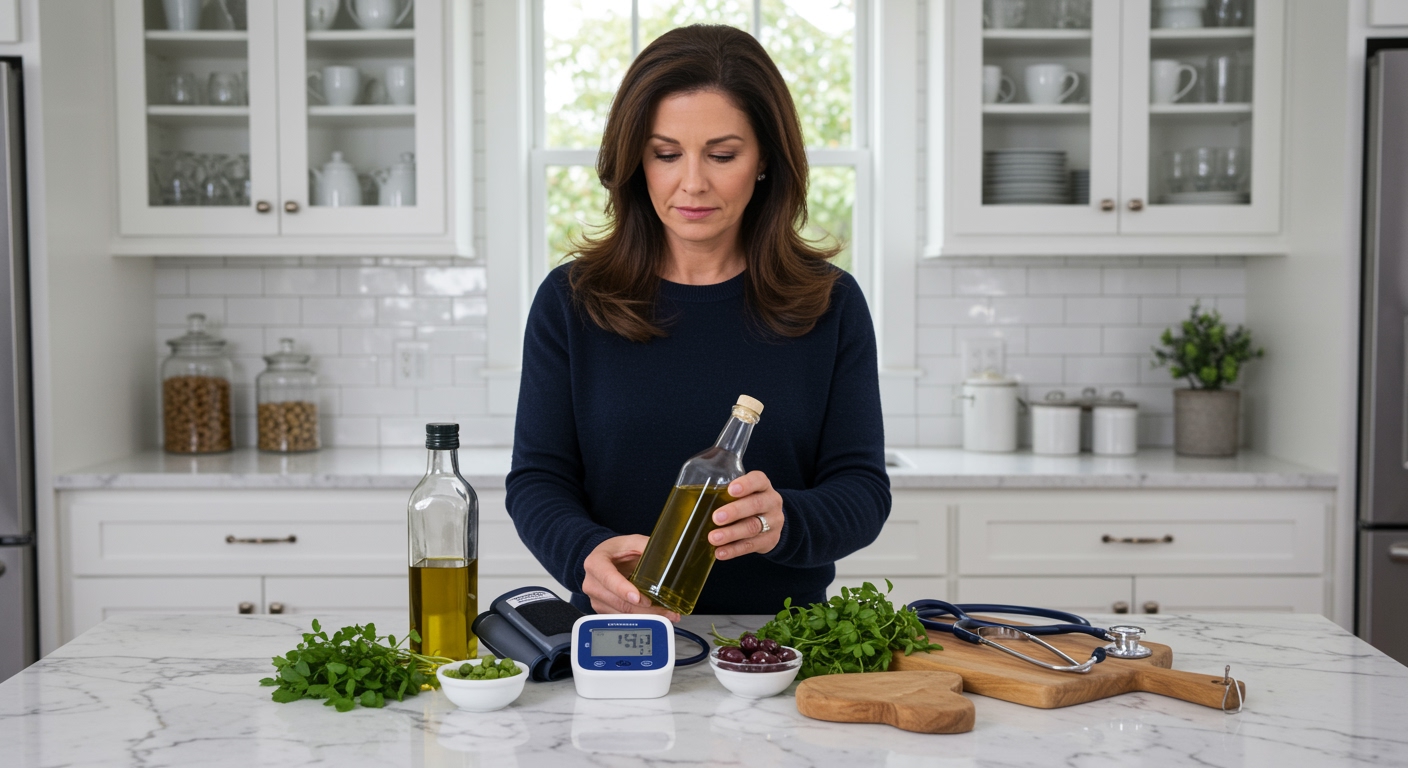✪ Key Takeaway: Olive oil typically lowers blood pressure, which may worsen hypotension symptoms in people with already low readings.
Introduction
You pour that golden olive oil over your salad thinking it will boost your health.
But if you have low blood pressure, this seemingly innocent habit might be making your dizziness and fatigue worse than you realize.
Hi, I am Abdur, your nutrition coach and today I am going to explain exactly how olive oil affects your blood pressure and what you need to know if you struggle with hypotension.
How Does Olive Oil Actually Affect Blood Pressure?
Olive oil contains powerful compounds called polyphenols that directly impact your cardiovascular system.
These natural chemicals work by relaxing your blood vessel walls through a process called vasodilation.
When your blood vessels relax and widen, your blood pressure naturally decreases.
Research shows that consuming just 30 grams of extra virgin olive oil daily can reduce systolic blood pressure by 7-10 mmHg in healthy adults.
The monounsaturated fats in olive oil also help improve your blood vessel flexibility over time.
This means regular olive oil consumption creates a cumulative effect that keeps lowering your blood pressure readings week after week.
✪ Fact: Extra virgin olive oil contains over 30 different polyphenol compounds that work together to reduce blood pressure.
What Happens When You Have Low Blood Pressure?
Low blood pressure, or hypotension, means your blood pressure readings consistently fall below 90/60 mmHg.
Your brain and vital organs struggle to receive adequate blood flow when your pressure drops too low.
This creates symptoms like dizziness, fatigue, blurred vision, and even fainting spells.
Your body tries to compensate by increasing your heart rate, but this often makes you feel weak and shaky.
Many people with hypotension feel worst in the morning when they first stand up or after eating large meals.
The condition becomes dangerous when your blood pressure drops so low that you lose consciousness or experience shock-like symptoms.
✪ Note: Blood pressure below 90/60 mmHg is considered low, but symptoms vary greatly between individuals.
Should You Avoid Olive Oil With Hypotension?
The answer depends on how severe your low blood pressure symptoms are.
If you experience frequent dizziness or fainting, adding more olive oil to your diet could worsen these episodes.
However, completely avoiding olive oil means missing out on its incredible anti-inflammatory benefits and heart-protective properties.
The key is finding the right balance for your individual situation.
Start by monitoring your blood pressure readings before and after meals that contain olive oil.
If you notice your pressure dropping significantly or symptoms getting worse, reduce your olive oil intake temporarily.
Many people with mild hypotension can still enjoy olive oil in moderation without major problems.
✪ Pro Tip: Keep a food and symptom diary to track how different amounts of olive oil affect your blood pressure.
What Are Better Alternatives For Low Blood Pressure?
Focus on foods that naturally help raise blood pressure instead of lowering it further.
Increase your sodium intake moderately through natural sources like sea salt, celery, and pickled vegetables.
Drink more water throughout the day to increase your blood volume, which helps maintain adequate pressure.
Small, frequent meals prevent the postprandial hypotension that happens when blood rushes to your digestive system after eating.
Consider switching to coconut oil or avocado oil for cooking, as these have less dramatic effects on blood pressure.
Caffeine from coffee or green tea can provide temporary blood pressure support when you need it most.
Always work with your healthcare provider to develop a comprehensive plan that addresses your specific hypotension triggers.
✪ Fact: Drinking 16 ounces of water can temporarily raise blood pressure by 10-15 mmHg within 15 minutes.
The Bottom Line
Olive oil is generally beneficial for heart health, but it can worsen symptoms in people with low blood pressure due to its natural ability to reduce blood pressure readings.
The healthiest approach is always the one that works for your unique body and circumstances.
I would love to hear about your experiences with olive oil and blood pressure management, so please share your questions or thoughts in the comments below.
References
At NutritionCrown, we use quality and credible sources to ensure our content is accurate and trustworthy. Below are the sources referenced in creating this article:
- Olive Oil Times: High Polyphenol EVOO Reduces Blood Pressure
- American Heart Association: Olive Oil May Lower Heart Disease Risk
- PubMed Central: Olive Oil and Blood Pressure Research
- Oxford Academic: Blood Pressure Effects of Olive Oil





